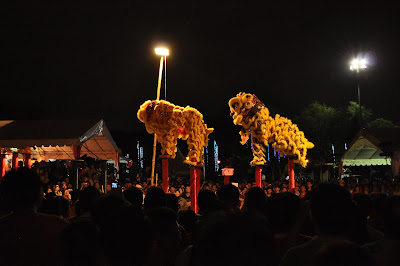Gong Xi Fa Cai! Happy New Year! This year is the year of the Dragon, which is very lucky for many of us! Chinese New Year is a two-week long celebration that started January 22nd this year. We got to experience the celebration at Craig's school, in the Penang Clan Jetty, and Chap Goh Meh.
The Friday before Chinese New Year, Craig's school had their celebration. This is Craig wearing his traditional Chinese garb eating Yee Sang salad, a traditional Chinese dish served during new year.
Yee sang means "prosperity". It's a mixed salad of carrots, daikon, red peppers, turnips, pickled ginger, and raw fish (Jennifer had the raw fish left out for the children). It starts out like the salad above, and everyone takes the chopsticks and lifts it high in the air while saying "lo hei".
The higher you lift the salad, the luckier you'll be next year. All of the children got a chance to try it! After the tossing, the salad is mixed and you get to eat it!
Jennifer also arranged to have a special Lion Dance and Dragon Dance as part of the Chinese New Year celebration at Craig's school. Here is the colorful beast, ready to entertain the crowd!
The lion is actually two boys. Here, one is sitting on the shoulders of the other, who is standing on a table.
The lion really played to the audience. If you look closely, you can see a very happy Craig smiling at the lion! Lion Dances are meant to ward off demons and make room for good luck and prosperity!
After the lion exited, eight more young men paraded in carrying a dragon! The dragon always follows the fireball, weaving in and out, twisting and turning on itself to the beat of the Chinese drums!
The dragon also scares away demons and brings luck and prosperity!
A week after the official start of Chinese New Year is Hokkien New Year, or the celebration of the Jade Emperor's birthday. We ran into the same performing troupe from the school celebration in the crowd! They recognized Jennifer. Everyone in Penang knows Jennifer!
Here is Jennifer with the Jade Emperor. The Jade Emperor is the main deity, and the creator of heaven and earth. The locals bring offerings to the temple during this time of year, including pineapples, oranges, and incense. The Chinese word for pineapples and oranges sounds like the Chinese word for luck and prosperity. The incense just makes things really smoky.
Hokkien New Year is celebrated at the Chinese clan jetties in Penang. The clan jetties are a series of houses build over the water. The walkways are very narrow, but brightly lit. Here's Jennifer and two of her good friends in Penang standing in the Lee family jetty.
The houses are built on stilts over the water. They were originally erected by Chinese dock workers who unloaded trading boats in the harbor. Entire families would build their houses this way, slowly expanding further out into the water as the number of relatives grew. Now, they are a part of Penang's World Heritage status, and a living reminder of the unique houses people had.
The local Chinese traditionally place offerings to the Jade Emperor outside their doorways on this night. However, as you saw above, there is very little space for altars in front of the homes on the jetty, so the whole neighborhood shares one!
Each household brings out an offering and places it on the red table. The Chinese word for red, coincidentally, also sounds like "luck" in Chinese. These roasted pigs will wait here on the table until the Jade Emperor has had a chance to take what he wants. Whatever he doesn't take will be removed and eaten by the donating family the next morning.
Of course, there were more lion dances and dragon dances. Jennifer was invited to lead this procession of amateur dragon dancers in front of the Chew family shrine. They did a great job of following the fireball! Penangites are always happy to have others participate in the fun!
The last day of Chinese New Year is Chap Goh Meh. My dad and step mom, Kathy, joined us for this celebration.
Chap Goh Meh is celebrated with more fireworks, dancing, and orange throwing. Unmarried ladies would write their name and phone number on an orange, and then throw it into the ocean. Young men who wanted to find true love would go fetch the oranges, and then call up the lucky lady to arrange a date. Today, everyone throws oranges into the sea. Craig had a good time flinging his fruit into the black depths!
Later that night we saw the spectacular lion dance performed on stilts! These two lions paraded around each other stepping on eight-inch circles set atop eight to ten foot tall pillars.
They are quite imposing when they stand up straight!
Yup, there's still two young men in there, one standing on the shoulders of the other, who is standing on pillars ten feet off the ground!
We wish all of you a very happy new year! May the year of the dragon bring you fortune and prosperity in all of your endeavors! Gong xi fa cai!!








































